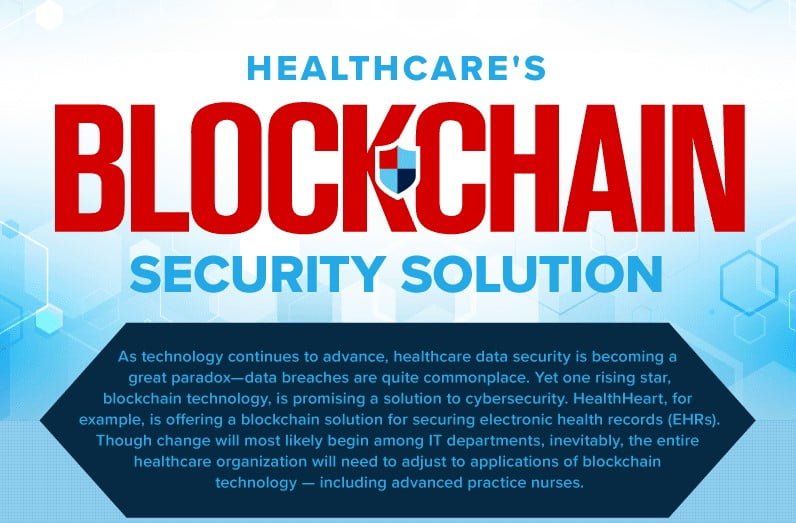What is Blockchain and what does it have to do with secure health data? Blockchain was initially developed as a fiat currency’s digital alternative, but its features soon found practical use in other industries as well.
Blockchain technology is an open, distributed ledger that can record transactions permanently, efficiently, and in a verifiable manner. Blockchain platforms have the ability to support the entire lifecycle of a patient’s electronic medical record. The tech uses “smart contracts” that are stored in transparent shared databases. These contracts are embedded in digital code that can’t be changed, tampered with, or deleted.
Blockchain technology has the potential to provide a brand new model for health data exchanges by making electronic medical records more efficient and cryptographically secure. It allows patients’ records to be accessed by healthcare providers at any time they are required, essentially giving patients and providers immediate access to all their healthcare information across all the providers they have ever seen.
Q2 hedge fund letters, conference, scoops etc
With blockchain technology, transactions between individuals, organizations, machines, and algorithms would be frictionless, quicker, and less expensive.
Blockchain technology incorporates into a single, easily accessible database where doctors can find all patients’ diagnoses, medical histories, information about which doctors conducted each treatment, the medication and dosage they prescribed regardless of the type of electronic medical systems they used.
This maximizes the results from the effort that doctors put into doing administrative work, and most of it can be replaced with productive doctor-patient relationship and care.
Preventing Data Breaches
Shockingly, one in four data breaches occur in the health data industry. These breaches have been predicted to affect one in thirteen patients between 2015 and 2019. According to a global study conducted by IBM and Ponemon Institute, in 2017 the cost of a data breach that occured in a major company averaged $3.62 million. The healthcare industry suffers the highest toll in terms of the cost of breaches, being about $380 per single compromised patient record, which is 2.5 times the global average when compared to other industries.
Once the data has been intercepted, hackers can sell patient files on the black market for as much as $20 a pop. They can also use the hacked info to create fake IDs, which could lead to insurance fraud or the purchasing of drugs and medical equipment that could be resold. Additionally, hackers can use the data as leverage in ransomware.
Healthcare data sells for a price 10 to 20 times more than a stolen Mastercard account. The reason is that unlike banking information, healthcare data stays correct for a lifetime.
With blockchain, a ledger will store health data but not identification. Users will have an address that’s secured with keys in their wallet. This patient-mediated health data exchange network will improve the efficiency of health data flow across the healthcare system, and it can allow patients to see who is accessing their data and for what purpose.
Protecting Your Information
Every doctor, medical office, hospital, pharmacy, therapist and insurance company needs different pieces of data to properly care for patients. These records are scattered across computers – and even filing cabinets. They’re not all kept up to date with current information as a person’s prescriptions change or new X-rays are taken, and they’re not easily shared from one provider to another.
In many cases, medical offices use more than two dozen systems for keeping electronic health data records, none of which can directly communicate with any of the others. All of these systems present opportunities for hackers to steal, delete or modify records either individually in massive amounts. In an emergency, doctors may not be able to get crucial medical information because it’s stored somewhere else. That can result in direct harm to patients.
“One of the major challenges in the healthcare industry today is how we can transmit patient data across geographies, without compromising privacy and security.” — Blockchain: A Healthcare Industry View, Capgemini
Blockchain at Work
Blockchain can also help other areas of the health data industry. The Centers for Disease Control and Prevention are developing blockchain-based systems to share data on threatening pathogens, analyze outbreaks, and manage the response to public health crises. Some commentators have even suggested that a blockchain system might help track opioid use and abuse.
Clinical trials, too, may benefit from blockchain. Today, patchy data and inefficient communication among all players involved in clinical trials pose serious problems. The drug discovery and development processes could see similar benefits. Pharmaceutical companies currently monitor drug shipments and delivery through an inefficient web of scattered databases. In 2017, Pfizer and other drugmakers announced their support for MediLedger, seeking to transfer those tasks to a blockchain – which Walmart is already doing to track its food shipments.
Blockchain in Other Industries
According to IBM, “Blockchain technology is a game-changer with the potential to impact not one or two industries, but the complete landscape of how business is done. Better data sharing between healthcare providers means a higher probability of accurate diagnoses, more effective treatments, and the overall increased ability of healthcare organizations to deliver cost-effective care.”
Other industries could potentially benefit from blockchain tech. The travel industry could use it for biometric verification. The security industry could implement it to store personal records. Retail stores could also use utilize it to access brand SKUs. Finally, the tech could be helpful in creating tamper-proof ledgers that could reduce voter fraud.
In conclusion, it may be several years before blockchain technology is fully accepted and integrated into the healthcare system. As IT departments and senior leaders consider the possibilities, advanced practice nurses must do their part to stay cognizant of blockchain technology advancements, and embrace changes and shifts in their daily responsibilities, whether this means educating patients about blockchain applications, monitoring data from remote devices via OOH blockchain applications, or adjusting to the ways health data is shared. To learn more, check out the infographic below created by the Duquesne University School of Nursing







